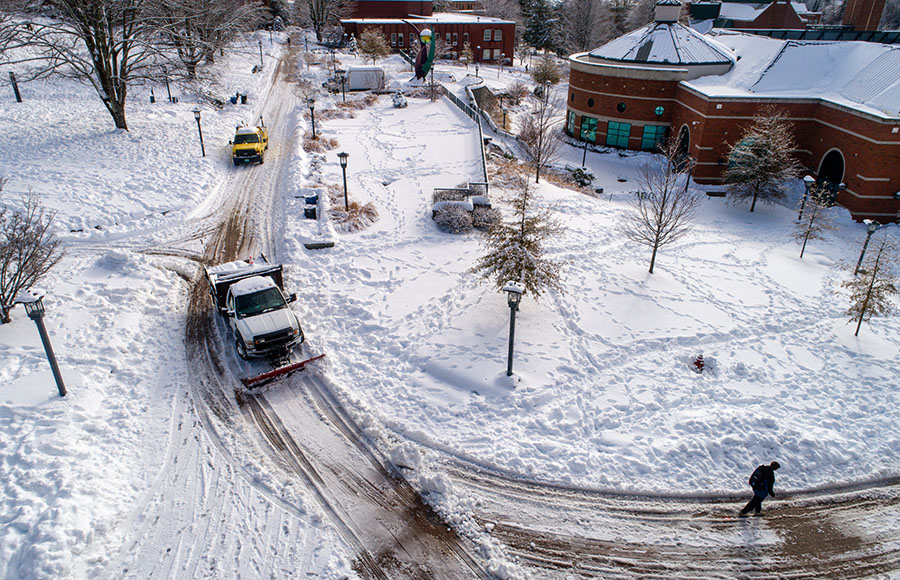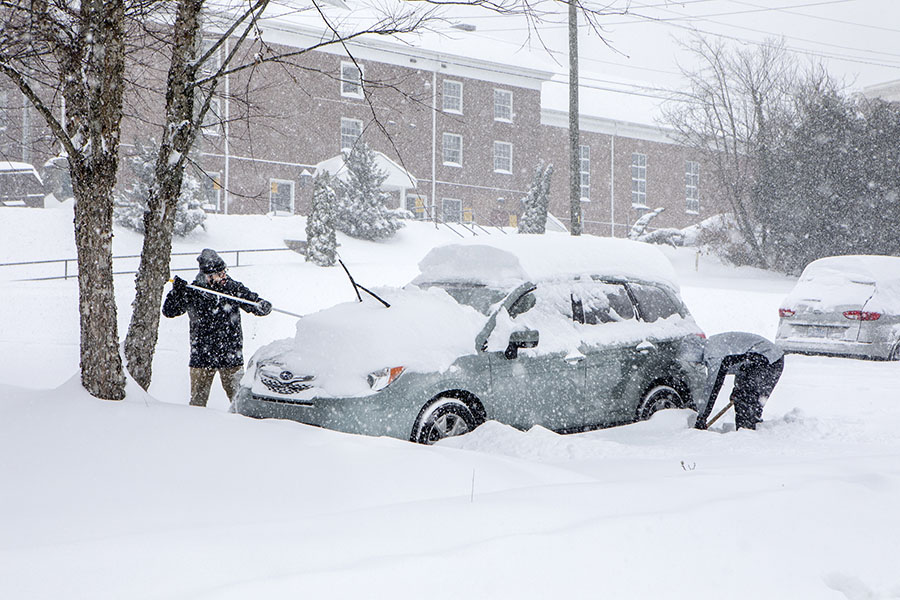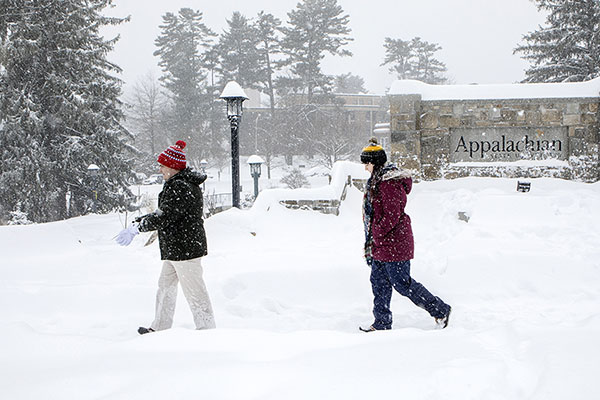BOONE, N.C. — As Appalachian State University students took their final exams in December 2018, the university’s Physical Plant, emergency response teams, Food Services and Parking and Transportation personnel were undergoing tests of their own. Winter Storm Diego deposited more than 18 inches of snow on campus in a span of 30 hours, exceeding the total snow accumulation for the entire 2016–17 season.
The storm’s magnitude, combined with its timing during exam week and the impending exodus of students leaving for winter break, spurred major efforts by Appalachian’s campus operations personnel, who had plans in place to manage the event. Following the storm, departments met to review issues and discuss best practices for handling future snowstorms of Diego’s caliber.
Recognizing the efforts of the support staff, Chancellor Sheri Everts said, “Our campus fared well. Crews worked nonstop to clear roads, sidewalks and parking areas. We are accustomed to the challenges of winter weather, and our campus and community personnel manage snow and ice safely, expertly and efficiently.”
As the snow began to fall on Saturday, Dec. 8, Food Services personnel, equipment operators, mechanics and other critical staff, whose services were required, checked in to local hotels to be readily available. Application of salt on roads and sidewalks began immediately, and snow removal crews began round-the-clock work to clear snow from roads, parking lots and sidewalks.
An estimated 63 tons of snow fell on campus bridges, sidewalks and parking areas. Crews worked 12-hour shifts and ran equipment continuously, tallying almost 1,700 hours by Motor Pool mechanics, grounds crews and Environmental Services staff over a five-day period.
Physical Plant Director Jeff Pierce said the biggest challenge was where to put the high volume of snow once it was pushed. Appalachian brought in contractors with skid loaders, backhoes and trucks to remove some of the piles from the parking lots and roadsides.
Working around cars left in parking lots also presented challenges, Pierce said. He added, “For safety, students were advised not to move their cars.”
Even though classes were not in session, the campus auxiliary services ran at full throttle. John Eckman, associate vice chancellor for auxiliary services, summarized the efforts to keep the campus operating:
- Food Services remained open and operating throughout the storm, serving 17,305 individuals, including students and emergency staff.
- The Department of Parking and Transportation fielded calls for help during and after the storm, dispatching assistance to stranded motorists.
- Parking and Transportation staff dug out over 430 cars by hand.
- Parking officers worked shifts to manage free parking at the Rivers Street Parking Deck.
Advance planning was responsible for much of the success, according to Emergency Management Director Jason Marshburn. Pre-storm planning sessions included several campus departments to ensure preparedness:
- Food Services worked with suppliers to have enough food delivered to sustain campus needs through the storm and its aftermath.
- Plows and snow clearing equipment were readied for use by the Physical Plant. Due to the anticipated snowfall, local contractors were engaged to supplement the campus’ snow removal team.
- Emails from Emergency Management were sent to students and staff with information on how to prepare for severe weather and how to stay informed about changes in schedules and available campus operations.
- Students were advised not to drive in severe weather and to have a readiness kit prepared.
Barry Sauls, director of parking and transportation, said hundreds of student vehicles were stranded on the main campus during the storm, and thousands more cars were buried in remote lots.
As students finished exams and started to head home for the winter break, snow clearing efforts had to be stepped up. “A lot of people worked tirelessly to help the campus community through this storm,” Sauls said.
About University Finance at App State
University Finance, an administrative division at Appalachian State University, provides effective and efficient accounting and budgeting of the university’s financial resources, while also providing services and support for the infrastructure, safety and physical operation of the university. Learn more at https://finops.appstate.edu.
About Appalachian State University
As a premier public institution, Appalachian State University prepares students to lead purposeful lives. App State is one of 17 campuses in the University of North Carolina System, with a national reputation for innovative teaching and opening access to a high-quality, cost-effective education. The university enrolls more than 21,000 students, has a low student-to-faculty ratio and offers more than 150 undergraduate and 80 graduate majors at its Boone and Hickory campuses and through App State Online. Learn more at https://www.appstate.edu.
What do you think?
Share your feedback on this story.







![How NCInnovation Is Rethinking Economic Development in North Carolina [faculty featured]](/_images/_posts/2026/02/rethinking-economic-development-600x400.jpg)






